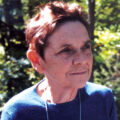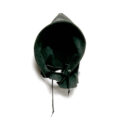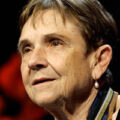6 Writers on the Lasting Influence of Adrienne Rich
Over the course of her long career, Adrienne Rich influenced innumerable poets, critics, editors, feminists and other activists. It would be hard to account for the breadth of it. Since my first encounter with her work in college, I have found her piercing intellect, vivid images, and idiosyncratic poetic sensibility deeply moving. Her work challenged me to be more ethical, self-conscious, and radically modest, finding the root of its power in humility, an ability to recognize wrong and revise one’s own self in response, to see other struggles and press the limits of your own compassion, to seek out an ethical life, as much as possible in a deeply unjust world, and act accordingly. And she did it through remarkable, unique, beautiful poetry.
At least, that’s my experience of Rich. But each person’s experience of her work is unique, depending on which Adrienne they encounter, when, and how. I couldn’t sum them all up and it wouldn’t be right to try. With that in mind, I invited six writers to reflect briefly on Adrienne Rich’s influence—personal, poetic, political. I’d like to thank Jessa Crispin, Christina Davis, Jill McDonough, Carissa Halston, Ailbhe Darcy, and Chloe Garcia-Roberts for sharing their insights.
—Daniel Evans Pritchard, CF founding editor.
JESSA CRISPIN
How many times as writers have we been told that we should leave politics out of our work? It dates it, critics say, it adds an element of anger that is inappropriate. In five years, the situation will have changed and so the work will no longer be relevant. I’ve seen this over and over in the critical culture, this unwillingness to engage with politics, this shying away from anger. It makes them uncomfortable.
Adrienne Rich, however, understood the exact spot where politics interfered with the body, and she worked from there. We exist in a society whose norms and expectations and corrode and control us, and yes, Rich was angry about her society’s particular norms and expectations. Her poetry woke some of us up, showed us how to see the influences and fight against them. She kept us company, empathized with us, marked out the pathway through so that we could create lives with love.
Today a large number of us, a shocking number of us, are still trying to be seen as people: women, minorities, gays and lesbians. As long as there are the powerful and the powerless, Adrienne Rich’s angry, political (beautiful) poetry will still be relevant. So, for a long time still.
Jessa Crispin is the founder and editor of Bookslut.
CHRISTINA DAVIS
“This Feather Stirs”: For Adrienne Rich
I was working at the Lame Duck bookstore in West Philadelphia. I was reading King Lear for class. I was reshelving a paperback book, light as the feather that would test the presence of Cordelia’s breath. It was called On Lies, Secrets, and Silence, the binding of which had loosened around a page with the following lines:
An honorable human relationship is a process delicate, violent, often terrifying to both persons involved, a process of refining the truths they can tell each other.
It is important to do this because it breaks down human self-delusion and isolation.
It is important to do this because in so doing we do justice to our own complexity.
It is important to do this because we can count on so few people to go that hard way with us.
Nothing that I would later learn—about signifiers, deconstruction, truth-value—has succeeded in interfering with my reception of this litany. It sits in the center of each poem I have since written or read, and makes demands.
It is no exaggeration to say that Rich’s book pivoted my existence, maybe just an nth, but nevertheless it was permanently stirred. Though I had always written poetry since the age of five, Rich gave me to know that I wanted to be a poet, and that to be a poet could constitute a civic contribution, to be someone who compels herself and by extension her readers to be relentlessly (at times, unbearably) aware. I experienced in that moment a baton being passed to me in the long relay: “to extend the possibilities of truth between us.”
After all, as Paul Celan writes: “Not-to-want-to-become-aware-of is the liar’s main business….”
Christina Davis is the director of the Woodberry Poetry Room at Harvard and the author of two collections of poetry, Forth a Raven and An Ethic.
JILL MCDONOUGH
Knowing Adrienne Rich’s “Song”
I memorized Adrienne Rich’s “Song” when I was a freshman in college. My friend Laura, studying to be a speech therapist, helped me say it like I meant it. Instead of pouring it all out, quick and panicked.
What I meant when I meant “You’re wondering if I’m lonely: / OK then, yes, I’m lonely”: there are a lot of ways to get to be a grownup, and being lonely actually seemed pretty hot. All I wanted to do was get out of there—wherever there was: being young?
driving across country
day after day, leaving behind
mile after mile
little towns she might have stopped
and lived and died in, lonely
That sounded great. I love how her poem says what it means, doesn’t fuck around. I was just learning that poems can talk like that. They can be sick of your shit, roll their eyes at you. Poems don’t have to pussy-foot around, sigh dramatically, wait for you to figure out what’s up. Poems can talk realer than real people mostly do; her poem did that.
“Aunt Jennifer’s Tigers” and “Diving into the Wreck” were some of the first poems I remember reading in an anthology. I just googled “Aunt Jennifer,” and Google suggested meaning, theme, analysis, summary, explanation. In my day it was all about the symbolism too y’all! The tiger a symbol, the ring a symbol, the needle, the wool: everything standing in for something else. As if a poem can’t be awesome without decoder rings. Before I knew what “denizens” or “chivalric” meant, I was thinking this teacher doesn’t know what the hell he’s talking about.
I think of “Song” whenever I’m landing at SFO—“aiming / across the Rockies / for the blue-strung aisles / of an airfield on the ocean.” I think of it whenever I pass the buckled salt marshes of the Cape in winter—“with the rowboat ice-fast on the shore / in the last red light of the year.” It comes up when I’m driving, “mile after mile,” particularly when I’m driving alone. My wife even knows the last stanza by now, although I bet she’s never seen it in print.
If I’m lonely
it’s with the rowboat ice-fast on the shore
in the last red light of the year
that knows what it is, that knows it’s neither
ice nor mud nor winter light
but wood, with a gift for burning.
2014 Lannan Fellow and three-time Pushcart prize winner, Jill McDonough’s books of poems include Habeas Corpus, Oh, James!, and Where You Live. She teaches creative writing at the University of Massachusetts, Boston.
CARISSA HALSTON
Adrienne Rich was the first poet whose work really reached me in undergrad, in a required class at UMass Boston called “Understanding Literature.” My professor centered the class around what she called “strange texts”: poems, plays, novels, and stories that require the reader to do real work to understand them. That might mean stepping outside of yourself in terms of what you normally read—translations, genre, etc.—it might mean reading outside of the canon, or outside of the set of authors whose checkboxes align with your own. In my case: white, female, tomboyish, American, emphasis on fiction.
This course defined for me what literature should do: force you to think about life and the world outside of yourself. Everyone in the class had to give a presentation on a living poet. This was the summer of 2010, when Rich was still alive, and I chose her after reading “Diving into the Wreck” and watching a Chilepoésia interview wherein, oddly enough, she talks about hard work—specifically, the work you need to do to be aware of the privilege inherent in being in love. It’s as insightful as any of her poems, and the video ends with her reading of “Planetarium”:
I have been standing all my life in the
direct path of a battery of signals
the most accurately transmitted most
untranslatable language in the universe
I am a galactic cloud so deep so invo-
luted that a light wave could take 15
years to travel through me And has
taken I am an instrument in the shape
of a woman trying to translate pulsations
into images for the relief of the body
and the reconstruction of the mind.
Those opening lines speak to the urgency of Rich’s work, still. The effort her writing exacts from the reader is about admitting complicity. Caroline Herschel, the astronaut whom Rich wrote the poem for/about, is a woman first, but here, also a stand-in for all women. All women are battered by signals—but so many women can’t see how they, themselves, become signals by being thrust in the path of expectation. They can’t see that we are symbols, or as Rich more eloquently puts it, “instrument[s] in the shape / of [women] trying to translate pulsations / into images for the relief of the body.” I don’t doubt she’s talking about the collective female body, a symbol that is too often assumed disconnected from any construction of the mind.
Writer, editor, and educator Carissa Halston is co-founder of Aforementioned Productions and author of A Girl Named Charlie Lester as well as The Mere Weight of Words.
AILBHE DARCY
I needed fox
and the thing I want to write about, I could call it a memory, since I can place it in time. I’m a young woman, discovering Rich among a raft of other poets. It is precisely a raft I am building out of poems, to float me away to any place that isn’t home. To adventure. To my future. This memory doesn’t land me in front of a book. It takes me walking in the dark under street lights. I was always walking in those days. I was always out late. I was looking for something, and then a fox would suddenly be looking at me:
recognition from a
triangulated face burnt-yellow eyes
I don’t quite want to call it a memory. This thing won’t stay put in time. A decade later, I’m a new mother, on the other side of the Atlantic, awake at night. I’m always awake. The child sleeps but I can’t sleep. I pace and stare out. I’m still looking for something, but urgently now. What I see in the window looking at me is Rich’s fox
fronting the long body the fierce and sacrificial tail
I’d rather call this thing a snarl than a memory. A snarl like a knot, because there is more than one poem in the tangle of meeting a fox. And although it’s very clear to me (has always been clear to me) that my fox is not a thought-fox, is not as comforting as Something else is alive, nonetheless if I could calmly end
The page is printed
I’d be grateful. Really I’d call this thing a snarl because it rears up in me, teeth bared. The fox hurts and makes rage. For a time, I was utterly stunned. It was always night-time after the baby. And I couldn’t seem to drown out that moment (at the origin of the snarl though not its earliest moment) when I was lying on a hospital bed, legs splayed, and it happened to me that I was animal in someone’s businesslike hands, and torn apart.
Go back far enough it means tearing and torn endless and sudden
back far enough it blurts
into the birth-yell of the yet-to-be-human child
pushed out of a female the yet-to-be-woman.
I lived it over and over and over. I used to ignore where Rich’s poem was going. I was young enough that I just loved meeting the fox in the night and thinking of myself as all that female potential,
a vixen’s courage in vixen terms
Now I hate the snarl as much as love it. Because where it gets me, is pain. The sharp memory of an ordinary pain. Sometime after my child was born, I learned again to sleep and ask for help
is the most riven the most revolted cry
and I haven’t seen a fox in a long time. But I won’t forget. I think I understand a little better now, and that I will need Rich all the more as I grow old.
Ailbhe Darcy, author of the poetry collection Imaginary Menageries, recently received her PhD from the University of Notre Dame.
CHLOE GARCIA-ROBERTS
I have taken the poetry of Adrienne Rich for granted. Throughout my life it has always been implicitly trusted. It has been something to stand on, to rest upon, and been a path to move forward on. But in the way the familiar often is, I turn to it without seeing it anymore. The work of Adrienne Rich for me holds all the quiet unassailable authority of a tool. More than read it, I use it.
There is a ladder.
The ladder is always there
hanging innocently
close to the side of the schooner.
We know what it is for,
we who have used it.
Adrienne Rich’s poetry has taught me discipline. That concentration is a force that gives counterpoint to the lushness of words. That density is created through the layering of bone and muscle and skin. She has shown me the presence of what is unsaid.
The words are purposes.
The words are maps.
Adrienne Rich’s poetry has taught me authority. That the use of lines with varying weights can, when interspersed with ridges of directly, simply spoken truth, create an efficacy.
I have to learn alone
to turn my body without force
in the deep element.
Adrienne Rich’s poetry has taught me direction. It has taught me that a destination is reached through repetition of movement, of line and of the telling of the author’s intent. Adrienne Rich’s poetry opened the inescapable gravity of truth to me, and I have never escaped it.
I go down.
Chloe García-Roberts is managing editor of the Harvard Review, author of The Reveal, forthcoming from Noemi Press, and translator of Chinese poet Li Shangyin’s Derangements of My Contemporaries.






